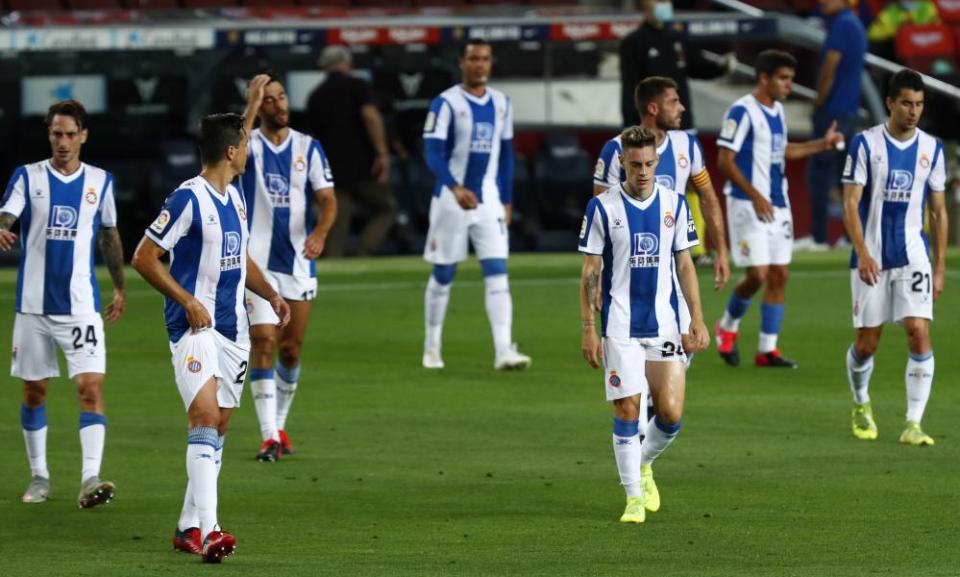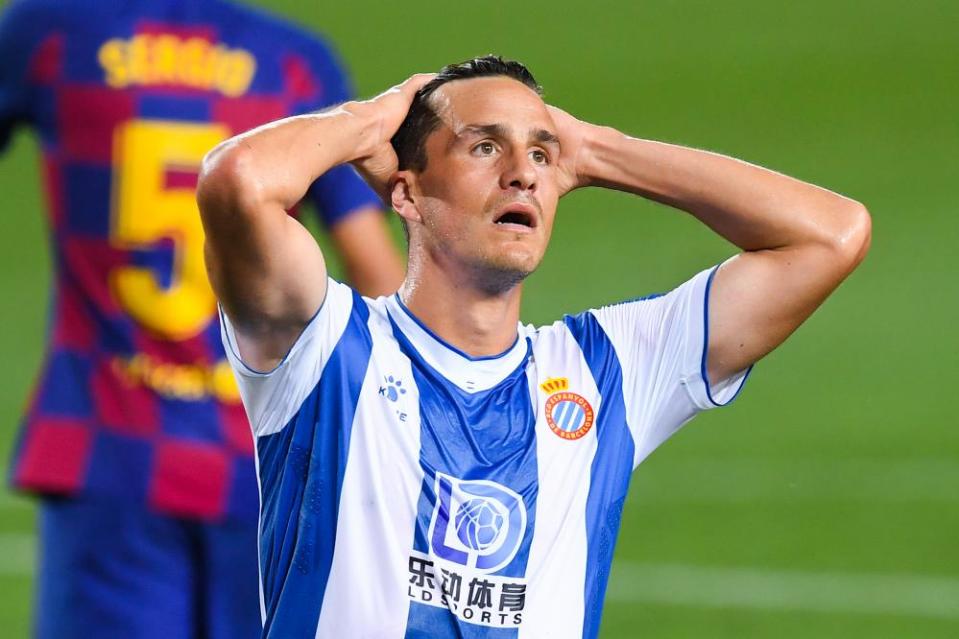Espanyol slip away to Barcelona's tune but the silence will sting too

Reial Club Deportiu Espanyol left the first division to the opening bars of “Cant del Barça”, the anthem of the club that has cast a shadow over them for so long. It was, their director general said, “a dark night”, although it could have been even darker. Relegated after 26 years and at the Camp Nou of all places, symbolism in them taking their first steps into segunda at their rivals’ home, this hurt. But at least there was virtually no one there to see it, no salt for their wounds, players slipping off silently when the end came.
As the final minutes ticked away, Víctor Sánchez sank his head into the seat, wanting it to be over. Sitting nearby, Raúl Tamudo swore into his mask. Below them, self-appointed emergency coach Francisco Rufete stood powerless, cap pulled down tight. Twelve years ago, Rufete’s pass released Tamudo to score a late equaliser here, denying Barcelona a title that turned on 18 ludicrous seconds. “The shag of the century,” AS called it. Some Espanyol fans consider that to be their best moment, certainly the most ecstatic. This was perhaps the most empty.
Related: Manuel Pellegrini to become Real Betis head coach from next season
Yet if this was Barcelona’s revenge, it was so cold it didn’t feel much like revenge; not with no one there to revel in it. “An event became a bureaucratic formality,” El País said. It should have been the derby distilled, rivalry reduced to its purest form; instead it felt diluted, despite having so much at stake. Perhaps because the idea that everything was in play – the title at one end, survival at the other – was superficial, as empty as the arena. Both teams knew their destinies were already decided and there was no one there to persuade them otherwise.
Espanyol had to win to survive. There wasn’t much hope – they had lost every visit in 11 years, going back to 2009. Even victory there and against Eibar, Valencia and Celta probably wouldn’t be enough – but one last act of defiance could at least definitively deny their neighbours the league, dulling their own pain. Instead, a game with two red cards but little tension was settled by a single goal, Luis Suárez’s strike confirming that a season which began with Espanyol returning to Europe closed with them down for the first time this century.
In the hours before the game, a banner was hung by the ground that said: “today could be a great day”. Someone had mocked up a coffin for Espanyol. And fireworks were let off, heard during the warm-up, after the hour, and even briefly at full time, Suárez jumping as it exploded during his post-game interview. But they were few and inside there were none: no one to sing “a segunda olé”.
At the final whistle, Lionel Messi shook Rufete’s hand and immediately disappeared. Espanyol’s players were as quick, virtually gone by the time the opening line boomed out of the PA system. “The whole ground is a clamour,” Barcelona’s anthem runs, but it wasn’t. Even Gerard Piqué, the man who had arrived on a bike and most embraces the rivalry, walked away without a word. Of Espanyol’s players only Javi López, the captain who hadn’t played, stopped to speak. “I’m here to say sorry,” he said. Sporting director general José María Durán came out later. “The fans don’t deserve this,” he said, although the fact he appeared before a plain wall rather than the Barcelona-branded backdrop probably said more.
But here’s the thing: if it could have been worse, there was also something in the silence that stung, symbolism there too. Espanyol call themselves the “marvellous minority” but often there’s little marvellous about it. Sometimes, there’s little, full stop – not much hatred to feed off, just indifference. And maybe that’s worse? Maybe that coldness cuts deeper?
This is the club often made to feel they don’t exist, whose rivalry isn’t always reciprocated. The Catalan derby has been tense at times, very tense. It has been nasty too. And it has been fun. But Barça-Espanyol is not Sevilla-Betis, Real Sociedad-Athletic, Madrid-Atlético, Celta-Depor, or Oviedo-Sporting. It’s not Barça-Madrid, either.
Barcelona are more than a club, they say. So is Catalonia, Espanyol fans retort, tellingly. Barcelona’s hegemony eclipses everything. Espanyol are not even the second biggest team in the city – that’s Real Madrid – and around 4% of Catalans support them. Their budget is a tenth of Barcelona’s and they have had to seek a space where there is none, partly defining themselves against their neighbours, conditioned by context. Resistance is written into their story but they have largely lost the battle for narrative. They have lost games too.
“It can seem like the whole of Barcelona is Barça but that feeling for Espanyol is very deep in places,” Ernesto Valverde, who has managed and played for both clubs, has said. But it’s declining, a development hard to arrest. Not just for Espanyol, but across Catalonia. That eclipse can feel deliberate too, or at least self-perpetuating. They’re the other team in Barcelona. Or, as Piqué pointedly put it, not even in Barcelona. There’s a political and social dimension. “Espanyol’s fans feel trodden upon; they make us invisible,” former coach Quique Sánchez Flores says. Writer Robert Basic likened supporting Espanyol to “choosing Sarajevo in the 90s when you could have a penthouse overlooking the Sacre Coeur.”
Espanyol have never been close to winning the title; Barcelona have 26 of them. Enric González claims being an Espanyol fan is to live “the existential void of those who suspect, with good reason, that God abandoned them for ever.” It has been hard enough to find a home: Sarrià was sold, Montjuic was rented and now they’re beyond the city limits, in a stadium that’s rarely full. “There’s a part of the character that says – we’re going down this year’” Valverde has said. In 2003, 2004, 2006 and 2009 they almost did. This year, like in 1962, 1969, 1989 and 1993, they actually did. Next year, if there is a city derby it will be against Barcelona’s B team.

But all that risks making relegation sound inevitable and Espanyol’s departure unimportant, like it doesn’t matter. Like no one cares when many do and everybody should. Espanyol are a huge club with a 119-year history and 30,000 socios. Every time they went down, they came straight back up – some light amid the gloom, along with the €30m parachute payment – and those relegations were rare. Espanyol have rarely even been in a fight to survive. Only Barcelona, Madrid and Athletic have more primera seasons. Until last night, Espanyol were one of only five clubs to spend all of this century there, winning two Cups and reaching another European final in that time.
Things weren’t supposed to end this way. The new stadium was the home they craved. In 2016 Chen Yansheng, who made his fortune in remote-controlled cars, bought the club, serviced the debt and invested €50m, convinced they could compete or at least co-exist with Barcelona. “Within three years, the Champions League,” he said. They finished eighth, 11th and then seventh, which wasn’t quite the same but was European football again after 12 years. That started in July and ended against Wolves in February. By then, things were falling apart.
Even before that, in fact. Success bred failure. In the summer, manager Rubi departed for Betis, taking centre-forward Borja Iglesias with him. Centre-back Mario Hermoso left for Atlético. Mario Vargas became their most expensive signing ever at €10.5m, Fernando Calero cost €8m, but it wasn’t enough. Coach David Gallego, promoted from the B team, collected five points from eight games and was sacked. Pablo Machín got five from 10 and was sacked too. Abelardo came but now he’s been sacked as well, three very different men befalling the same fate.
Related: European roundup: Suárez's winner for Barça condemns Espanyol to relegation
“Maybe I’m a masochist,” Abelardo said when he arrived. Espanyol were bottom but he brought hope, equalising late against Barcelona, and the club bought players, spending €0m in the winter. Raúl de Tomás came with his perfect hair and matinee moustache and scored four in four. He’s still got four now, falling in injury soon after, hope gone and typical somehow. Chen released a video taking the blame but everything that could go wrong. Eight players have tested positive for coronavirus, more than anywhere else.
In the autumn, Machín lamented a lack of leaders, demanding “real guys”, not kids – men who “feel their profession.” Last night Durán bemoaned “a defeatist attitude” claiming “the team stopped fighting.” Graffiti had appeared, threatening players. Chilling messages read: “you’ll run more than you’ve run in your life,” “Barcelona is small”, “there are consequences to toying with our passion.” After losing to Levante, Abelardo suggested some players weren’t giving their all. It was broken and in one last, desperate, doomed roll of the dice Rufete made himself emergency coach, his failure doubled.
Espanyol have changed general director, commercial director and sporting director, but not their fate. Four coaches have delivered five wins, leaving them bottom for 19 long weeks and in the relegation zone since September. There is no way out now, their worst ever season quietly coming to a close at the Camp Nou, accompanied by someone else’s song.

 Yahoo Sport
Yahoo Sport 




































